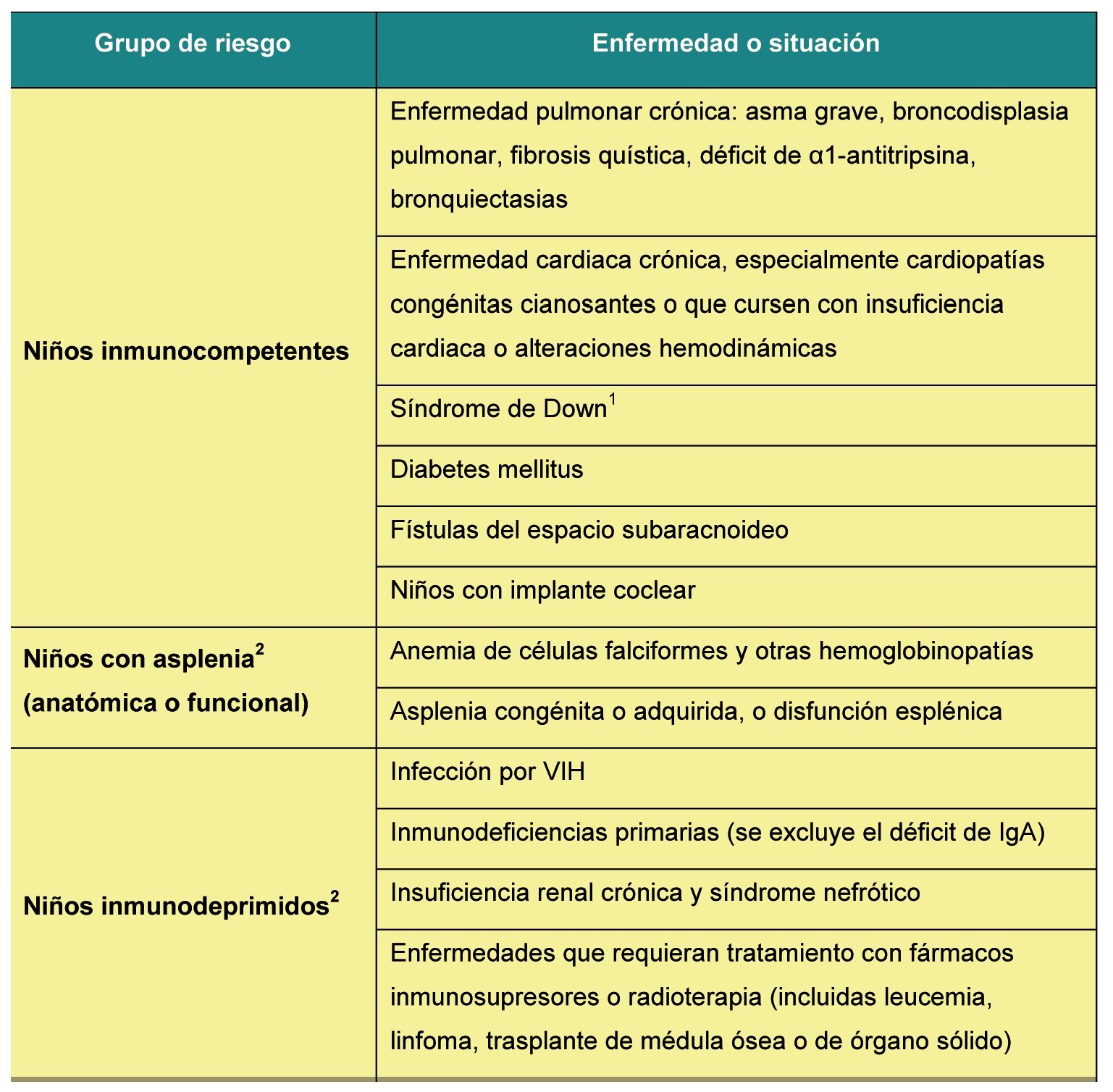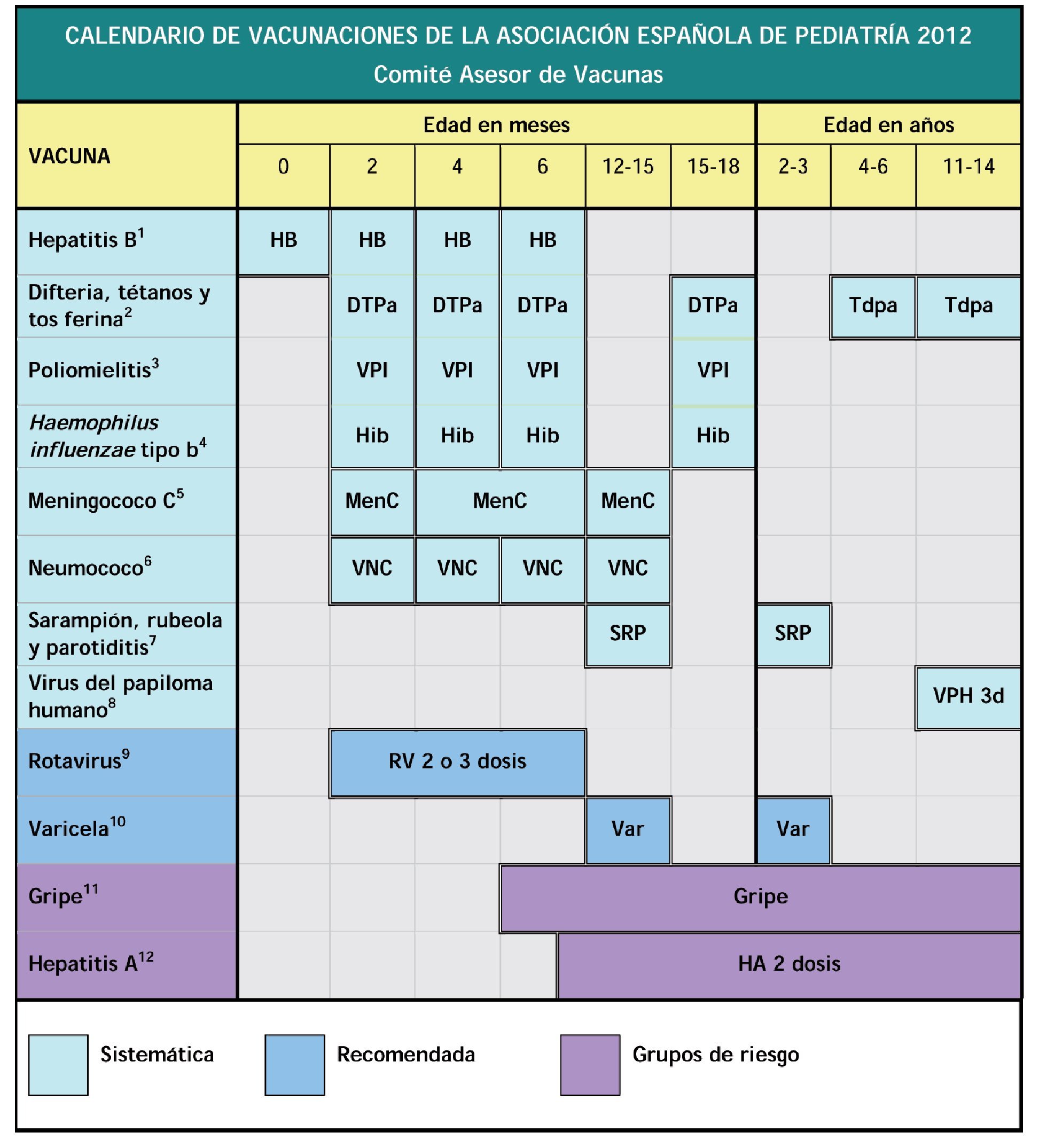El Comité Asesor de Vacunas de la Asociación Española de Pediatría (CAV-AEP) actualiza anualmente el calendario de vacunaciones teniendo en cuenta tanto aspectos epidemiológicos como de efectividad y eficiencia de las vacunas.
El presente calendario incluye grados de recomendación. Se han considerado como vacunas sistemáticas aquellas que el CAV-AEP estima que todos los niños deberían recibir; como recomendadas, las que presentan un perfil de vacuna sistemática en la edad pediátrica y que es deseable que los niños reciban, pero que pueden priorizarse en función de los recursos para su financiación pública, y dirigidas a grupos de riesgo, aquellas con indicación preferente para personas en situaciones de riesgo. Los calendarios de vacunaciones tienen que ser dinámicos y adaptarse a los cambios epidemiológicos que vayan surgiendo, pero el CAV-AEP considera como objetivo prioritario la consecución de un calendario de vacunación único para toda España.
Teniendo en cuenta los últimos cambios en la epidemiología de las enfermedades, las principales novedades propuestas en este calendario son: la administración de las primeras dosis de las vacunas triple vírica y varicela a los 12 meses (rango: 12-15 meses) y la segunda dosis a los 2-3 años, preferentemente a los 2 años, así como la administración de la vacuna frente a difteria, tétanos y tos ferina acelular a los 4-6 años, siempre acompañada de otra dosis a los 11-14 años.
El CAV-AEP estima que deben incrementarse las coberturas de vacunación frente al papilomavirus humano en las niñas de 11-14 años. En la recomendación se reafirma incluir la vacunación frente al neumococo en el calendario de vacunación sistemática. La vacunación universal frente a la varicela en el segundo año de vida es una estrategia efectiva y, por tanto, un objetivo deseable. Dada la morbilidad y la elevada carga sanitaria, la vacunación frente al rotavirus es recomendable en todos los lactantes. Se insiste en la necesidad de vacunar frente a la gripe y la hepatitis A a todos los que presenten factores de riesgo para estas enfermedades. Finalmente, se insiste en la necesidad de actualizar las vacunaciones incompletas con las pautas de vacunación acelerada.
The Advisory Committee on Vaccines of the Spanish Paediatric Association (CAV-AEP) updates the immunisation schedule every year, taking into account epidemiological data as well as evidence on the effectiveness and efficiency of vaccines.
The present schedule includes degrees of recommendation. We have graded as routine vaccinations those that the CAV-AEP believes all children should receive; as recommended those that fit the profile for universal childhood immunisation and would ideally be given to all children, but that can be prioritised according to the resources available for their public funding; and as risk group vaccinations those that specifically target individuals in risk situations. Immunisation schedules tend to be dynamic and to adjust to ongoing epidemiological changes. Nevertheless, achieving a unified immunisation schedule in all Spain is a top priority for the CAV-AEP.
Based on the latest epidemiological trends, the main changes introduced to the schedule are the administration of the first dose of the MMR and the varicella vaccines at age 12 months (range: 12-15 months) and the second dose at age 2-3 years, preferably at 2 years of age, and also the administration of the Tdap vaccine at age 4-6 years, always followed by another dose at 11-14 years of age.
The CAV-AEP believes that the coverage of vaccination against human papillomavirus in girls aged 11 to 14 years must increase. It reasserts its recommendation to include vaccination against pneumococcal disease in the routine immunisation schedule. Universal vaccination against varicella in the second year of life is an effective strategy and therefore a desirable objective. Vaccination against rotavirus is recommended in all infants due to the morbidity and elevated healthcare burden of the virus. The Committee stresses the need to vaccinate population groups considered at risk of influenza and hepatitis A. Finally, the Committee emphasises the need to bring incomplete vaccinations up to date using the accelerated immunisation schedule.
Artículo
Comprando el artículo el PDF del mismo podrá ser descargado
Precio 19,34 €
Comprar ahora







